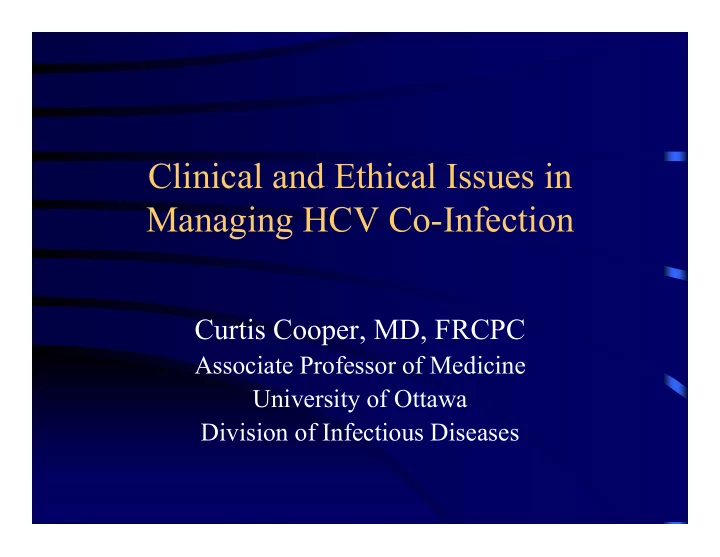

Clinical and Ethical Issues in Managing HCV Co-Infection Curtis Cooper, MD, FRCPC Associate Professor of Medicine University of Ottawa Division of Infectious Diseases
Disclosures • Industry – Investigator: Merck, GS, Abbvie – Consultant /Advisor: Merck, GS, Abbvie – Speaker: Merck, GS, Abbvie • Government – MOH – OHTN – CIHR – CDR – Health Canada – MAC-FI HIV, HCV
HIV-HCV Co-Infection
Case 45 yo HIV-HCV male Risk Factor- IDU- still active Used ETOH in the past now the occasional bender HIV- Atripla x 6 years Episodes of treatment interruption but when on ARVs, rarely misses CD4- 450 HIV RNA- <40
Case Likely HCV-infected in early 20’s Genotype 1 HCV RNA 7.8 x 10 5 IU/mL Received Peg-IFN / RBV in 2007 but interrupted after 6 weeks for poor tolerance and a ‘bender’ (RNA declined by about 2 logs at week 4) Bx in 2006 suggested stage 2 fibrosis but poor quality and during a period of excess alcohol use No Fibroscan performed but APRI 1.8
Case Patient is a daily MJ users and frequently takes ‘liver cleansing’ remedies Has a longstanding PPI prescription which he uses PRN for GERD
Case Patient wants therapy now…. Key questions: What are the DAA treatment options? What are the DDI concerns? What is the best fibrosis assessment modality? What about re-infection risk? Are HCV treatment outcomes really as good in HIV- HCV co-infection as they are in HCV mono-infection?
Canadian HIV/Hepatitis C Management and Treatment Guidelines CIHR CANADIAN HIV TRIALS NETWORK (CTN) • Similar mx in HIV-HCV as HCV mono-infection • Anticipated SVR rates in HIV-HCV co-infection are similar to HCV mono-infection with interferon- free, DAA regimens • Carefully evaluate for DDIs before and during treatment • Select ARVs in anticipation of subsequent HCV DAA treatment • Discuss harm reduction strategies in those at risk for HCV exposure Active injection drug use • MSM •
Key Co‐Infection Regimens • • Sofosbuvir + daclatasvir Grazoprevir + elbasvir (ALLY‐2) (N=203) 1 (C‐EDGE) (n=218) 2 Treatment-naive Treatment- Adapted from experienced 1. Levin J, et al. Presented at EASL 2015; Poster #P1353. 2. Rockstroh JK, et al. Presented at EASL 2015; Poster #P0887.
ION‐4 Overall Overall Naïve vs Experienced Cirrhosis Status SVR12 (%) 258/268 63/67 321/335 142/150 179/185 HCV Rx HCV Rx No Cirrhosis Cirrhosis Overall Experienced Naïve 10 Error bars represent 95% confidence intervals. Naggie S, et al. ION-4 Study. NEJM 2015
‡ ASTRAL-5 HIV/HCV Coinfection Study Results: SVR12 by Cirrhosis or Prior Treatment 100 97 94 97 94 93 100 95 80 SVR12 (%) 60 40 20 101 82 19 71 30 45 56 106 87 19 75 31 48 58 0 Non‐ Treatment Treatment Black Non‐black Total Cirrhotics cirrhotics Naïve Experienced High SVR12 achieved in HIV‐coinfected patients regardless of cirrhosis status and treatment experience † Patients LTFU were incarcerated, one patient on Day 1 and one patient on Week 4 Error bars represent 95% confidence intervals. 12 Brau, IAS, 2016; Data on File, Gilead Sciences.
Drug-Drug Interactions between HCV DAAs and HIV Antiretrovirals 13
Impact of DAA Regimens on Co-Infection Guidelines Priority shifts from early HIV treatment to early HCV treatment Fewer contraindications for HCV treatment Target populations for HCV antiviral tx is expanded Issues related to DDI reduced Benefits for Patient-Health Care Team relationship Increased network of HCV treaters
Barriers Concentration of Barriers to Engagement and Treatment Success Socioeconomic Mental Health Substance Abuse Stigma Diverse populations within the HIV community
Research Needs Non-Genotype 1 Treatment Treatment of HIV-HCV co-infection in more advanced disease RGT HCV treatment post OLT
HIV-HCV Management Conclusions Gap in SVR has been bridged Safety and tolerability issues eliminated Tx issues not unique to HIV-HCV Same general approach to work-up, treatment and long-term follow-up
Discussion
Recommend
More recommend